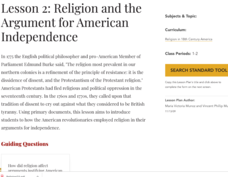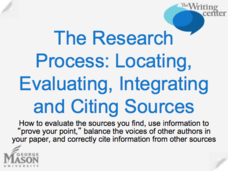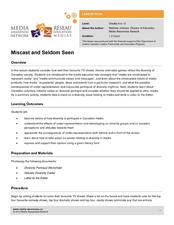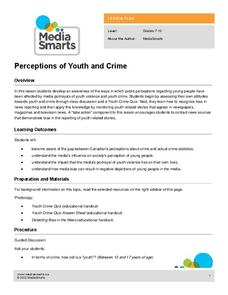Kentucky Department of Education
Kentuckians in the Civil War Era: Constructed Response Essay
What part did Kentucky play in the Civil War? A constructed response essay assignment tests to ensure scholars understand the concepts and the arguments for the causes of the Civil War. Learners must read a primary source quote and then...
National Endowment for the Humanities
Lesson 4 James Madison: Internal Improvements Balancing Act—Federal/State and Executive/Legislative
Who has the power? The founding fathers asked the same question when the United States was formed. Learners explore issues that arose during Madison’s presidency that raised constitutional questions. Through discovery, discussion, and...
National Endowment for the Humanities
Lesson 1: The First Great Awakening
High schoolers examine the First Great Awakening and how it affected religious belief in colonial America. They read and analyze primary source documents, explore various websites, and write a five-paragraph essay examining the beliefs...
National Endowment for the Humanities
Lesson 2: Religion and the Argument for American Independence
Young scholars examine how religion affected arguments justifying American independence. They read and analyze primary source documents, and write an essay analyzing how Americans used religious arguments to justify revolution against a...
National Endowment for the Humanities
The Rise and Fall of Joseph McCarthy
"I have here in my hand . . ." The war against Communism and Joseph McCarthy’s place in it are the focus of a series of lessons examining postwar America from 1945-1954. Joseph McCarthy takes center stage in this, the final lesson of the...
National Endowment for the Humanities
Ending the War, 1783
The various peace proposals, made by both sides, to end the Revolutionary War come under scrutiny in this final lesson of a three-part series on the war. Class members read primary source documents and compare them with military...
National Endowment for the Humanities
The War in the North, 1775–1778
Using primary source documents, including maps, learners examine Revolutionary War events from 1775 to 1778. The focus here is on the challenges George Washington and the Continental army faced and how they persevered in spite of those...
National Endowment for the Humanities
The War in the South, 1778–1781
The second in a three-part look at the Revolutionary War focuses the years from 1778 through 1781 and zooms in on military operations in the southern colonies, the French alliance, and the role African-Americans played in events. Class...
Curated OER
Introduction to Age of Absolutism
Who were the absolute monarchs of Europe and what effect did they have on their countries? Young historians begin by naming qualities they believe are important for a monarch to possess. They then take notes on four key factors leading...
National Endowment for the Humanities
A Journalist’s Report: The Better Vision for Black Americans
After reading a series of primary source documents detailing the teachings of Martin Luther King, Jr. and Malcolm X, class members craft newspaper columns assessing the strengths and weaknesses of each man's vision, and present their...
Curated OER
Writing a Literary Analysis
What makes writing literary? What comprises analysis? A 15-slide PowerPoint presentation, created by the Purdue University Writing Lab, tackles these questions. The explanations of what makes writing literary and what comprises analysis...
Curated OER
Fugitive Slaves and the Underground Railroad
Eleventh graders consider the impact of the Underground Railroad. In this slavery activity, 11th graders examine primary documents as they conduct independent research to explore the role of the Underground Railroad during the fight for...
Curated OER
From Smithson to Smithsonian: Who Was James Smithson?
Learners evaluate and examine primary and secondary source material as they relate to the life of James Smithson.In this "From Smithson to Smithsonian" lesson, students analyze documents looking for clues to the identity of James Smithson.
Curated OER
Journalism: Quoting Sources
Students examine the use of sources and their quotes in news writing. They determine the reasons specific persons are used as sources and why their opinions are relevant to the article. In groups, they identify sources in articles and...
Curated OER
College Research Skills: Evaluating Reliable Online Sources
Students analyze Public Art in preparation for college discussion, research, and writing, and create their own artistic creations. In this art and college prep lesson plan, students develop an original research question to explore an art...
Curated OER
The Research Process: Locating, Evaluating, Integrating, and Citing Sources
Planning on assigning a research project to a high school or college class? Although text-heavy, the concise explanations, color-coded examples, and writing tips included in this presentation make in worth a preview.
Curated OER
Plagiarism Workshop
What do George Harrison, Vanilla Ice, and Steven Ambrose all have in common? The Warner Brothers’ films Batman Forever and The Devil’s Advocate? All are guilty of plagiarism. And if you are considering a research project and want to...
Curated OER
Assessing Research Materials
Teaching learners how to evaluate a research source is an important part of the research process. The fresh idea here is that groups first develop a list of reasons why resources should be evaluated, transform these reasons into...
Curated OER
Consider the Source
Students explain how to critically compare news reporting from around the world, focusing on coverage of the Taliban regime. They compare and contrast television and print media reporting on the issue.
iCivics
Drafting Board: Interest Groups
Does the influence of interest groups harm a political system? Your class members will analyze the role of interest groups in American politics, as well as consider the effect of perspective, bias, loyalty, and the First Amendment.
Curated OER
Letters from the Japanese American Internment
Students delve into primary research. In this Japanese Internment lesson plan, students make deductions about life in an internment camp by reading and comparing letters written to Clara Breed. Along the way, they consider the advantages...
Curated OER
Edward R. Murrow: This Reporter
What would Edward R. Murrow think of today’s news broadcasts? Learners examine the work of the first public television newscaster and his commitment to researched, accurate reporting. The eight-day study concludes with investigators...
Curated OER
Miscast and Seldom Seen
Consider how well students' favorite TV shows, movies and video games reflect the diversity of society. The lesson introduces your class to several media literacy concepts, such as how media conveys values and messages, as well as the...
Media Smarts
Perceptions of Youth and Crime
Explore the potential for bias in the news and in scholars' own attitudes and opinions. Begin with a quiz on youth crime to see how learners perceive crime among their peers. After looking at the correct answers, put individuals in...
Other popular searches
- Primary Sources
- Alternative Energy
- Primary and Secondary Sources
- Energy Resources
- Energy Sources
- Light Sources
- Water Sources
- Sources of Water Pollution
- Citing Sources
- Primary Resources
- Alternative Energy Sources
- Alternative Fuels

























